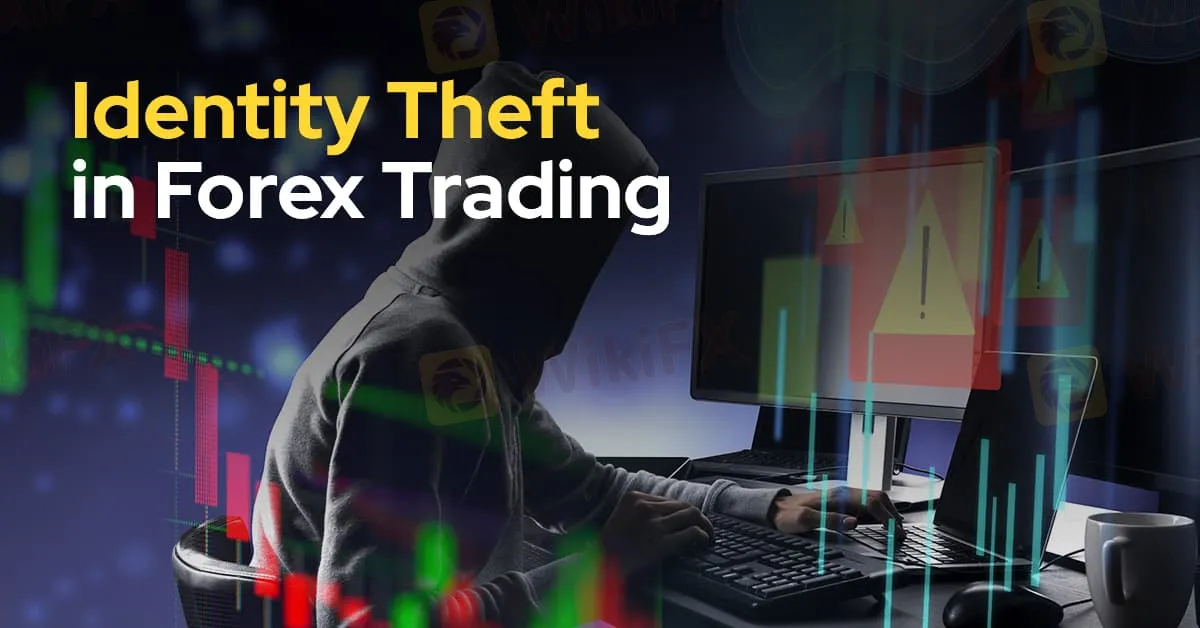简体中文
繁體中文
English
Pусский
日本語
ภาษาไทย
Tiếng Việt
Bahasa Indonesia
Español
हिन्दी
Filippiiniläinen
Français
Deutsch
Português
Türkçe
한국어
العربية
Identity Theft in Forex Trading
Abstract:Identity theft is a critical issue affecting various sectors, and the forex trading industry is no exception.

Identity theft is a critical issue affecting various sectors, and the forex trading industry is no exception. This form of fraud involves the unauthorized use of someone's personal information, such as their name, address, date of birth, and financial details, to open a forex trading account or carry out fraudulent transactions. As the forex market grows and evolves, so do the tactics employed by fraudsters to exploit vulnerabilities.
How Identity Theft Occurs in Forex Trading
Fraudsters use a variety of methods to obtain personal information, including:
Phishing Scams: Fraudsters may send deceptive emails or messages that appear to be from legitimate forex companies or financial institutions. These communications often include links to fake websites designed to collect personal and financial information.
Social Engineering: Scammers may use psychological manipulation to trick individuals into revealing sensitive information. This could involve pretending to be someone the victim knows or creating a sense of urgency to prompt the victim to disclose their details.
Data Breaches: Large-scale data breaches can expose vast amounts of personal information. When hackers gain access to databases containing sensitive data, they may use this information to commit identity theft in the forex sector.
Risks to Forex Companies
Forex companies face significant risks due to identity theft:
Opening Fraudulent Accounts: Fraudsters can open trading accounts using stolen identities. Once an account is established, they may execute unauthorized trades, manipulate markets, or withdraw funds fraudulently. This not only causes financial losses but also damages the company's reputation.
Fraudulent Transactions: With access to a victim's personal information, fraudsters may carry out fraudulent transactions that can disrupt trading activities and result in financial losses for both the company and its legitimate clients.
False Account Information: Forex companies may receive inaccurate or misleading information from clients. For instance, a client might provide false identification documents, employment details, or financial statements to open an account and engage in illegal activities, such as money laundering or market manipulation.
Mitigating Identity Theft Risks
To combat identity theft, forex companies should implement robust security measures:
Enhanced KYC Procedures: Strengthen Know Your Customer (KYC) protocols to verify the authenticity of client information. This may include biometric verification, additional documentation, and cross-checking information with official databases.
Anti-Fraud Technologies: Employ advanced technologies like artificial intelligence and machine learning to detect unusual trading patterns and identify potential fraudsters. These tools can analyze vast amounts of data to flag suspicious activities.
Employee Training: Regularly train employees to recognize phishing attempts, social engineering tactics, and other common fraud techniques. Ensuring staff are aware of these threats helps prevent security breaches and unauthorized access.
Data Protection Policies: Implement stringent data protection policies to secure client information. This includes encryption, secure storage, and regular audits to ensure compliance with data protection regulations.
Conclusion
Identity theft presents a significant threat to the forex trading industry, with the potential to cause financial damage and undermine client trust. By understanding the methods used by fraudsters and adopting comprehensive security measures, forex companies can better protect themselves and their clients from the adverse effects of identity theft. As the industry continues to grow, vigilance and proactive measures remain crucial in safeguarding against this evolving threat.

Disclaimer:
The views in this article only represent the author's personal views, and do not constitute investment advice on this platform. This platform does not guarantee the accuracy, completeness and timeliness of the information in the article, and will not be liable for any loss caused by the use of or reliance on the information in the article.
Read more

Top 10 Trading Indicators Every Forex Trader Should Know
Master the top 10 Forex trading indicators to analyze real-time Forex quotes, trends, and market signals. Learn strategies to boost accuracy and avoid mistakes.

Geopolitical Events: What They Are & Their Impact?
You've heard many times that geopolitical events have a significant impact on the Forex market. But do you know what geopolitical events are and how they affect the FX market? Let us learn about it today.

Why Do You Feel Scared During Trade Execution?
Trade execution is a pivotal moment for traders. It is when analysis turns into action, and potential profits or losses become reality. However, for many traders, this moment is accompanied by fear. Why does this happen, and how can you address it?

WikiEXPO Global Expert Interview: Simone Martin—— Exploring Financial Regulation Change
In the midst of financial innovation and regulation, WikiGlobal, the organizer of WikiEXPO, stays abreast of industry trends and conducts a series of insightful and distinctive interviews on pivotal topics. We are delighted to have the privilege of inviting Simone Martin for an in-depth conversation this time.
WikiFX Broker
Latest News
Volkswagen agrees deal to avoid Germany plant closures
Geopolitical Events: What They Are & Their Impact?
Top 10 Trading Indicators Every Forex Trader Should Know
TradingView Launches Liquidity Analysis Tool DEX Screener
MultiBank Group Wins Big at Traders Fair Hong Kong 2024
WikiEXPO Global Expert Interview: Simone Martin—— Exploring Financial Regulation Change
'Young investors make investment decisions impulsively to keep up with current trends' FCA Reveals
Why Do You Feel Scared During Trade Execution?
CySEC Settles Compliance Case with Fxview Operator Charlgate Ltd
Malaysian Influencer Detained in Taiwan Over Alleged Role in Fraud Scheme
Currency Calculator


